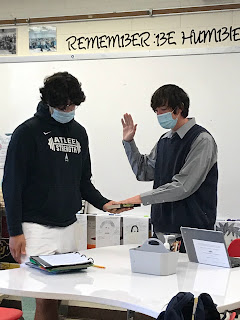When I was in the sixth grade, my teacher told us that most presidents don't really write their own speeches; they have speechwriters. I remember, at the time, feeling so disheartened, so cheated by this idea that their words were not their own. FDR may have uttered "The only thing we have to fear is fear itself," but he didn't write it? JFK may have inspired us with "If not us, who? If not now, when?" but he didn't pen those words himself? My twelve year-old mind just could not accept this. Yet, really, these presidents were not acting in deception as I thought, but rather, they were standing on the shoulders of giants.
That phrase was first written in a letter by Sir Isaac Newton when he wrote, "If I have seen further, it is by standing on the shoulders of giants." Often used in the scientific world to discuss progress and innovation, Newton's words still reign true today. We all have people who come before us, who inspire us, who make us better. In my first years of teaching I had a teacher named Mr. Svor who taught me everything he knew about being a classroom teacher. Mr. Svor was beloved by all of his students. He was creative in the classroom and talked to every kid in the hallway whether he knew them or not. He loved the Beatles and just about every cubic centimeter of his classroom was decorated. I also was lucky enough to be mentored by Mrs. Spanberger, who had more energy than I did, could grade an essay faster than anyone I knew, could recite the lines of The Crucible effortlessly, and who easily could relate to all of her students. These two teachers coupled with the ladies of the round table of the Godwin English Department became my mentors. They taught me to work hard and laugh harder. They solved problems around a bowl of popcorn. And they always looked out for me. I didn't realize it then, but they allowed me to stand on their shoulders. For years, I never believed I would be the kind of teachers they were. Now, I realize they were the expert educators who made me better, who made me the educator I am today.
So much of what we do in life can be fiercely competitive. I've seen it from who is the better mother among friends to who got the better grade in my classroom. My advice--don't be intimidated by the giants around you. Instead, thank them. Raise each other up. Work together. Don't worry about your class rank (As the cliche goes, you're more than a number). Don't compare yourself to anyone. Remember how far you've come and where you've progressed.
This month, I've watched many of you stand on each other's shoulders. Composition Theory students, you've seen close to 200 students in our writing center. You are a well-oiled machine because you work together. You're not afraid to seek the advice of those who tutored in previous years. In my IB English class, you, too, have raised each other up. Your mock trial on Frankenstein showed a solid team effort. One of you even out-argued me as an attorney. I watched as some of you passed laptops back and forth to work as a team. TOK Seniors, what I witnessed this past month in fixing up the Raider Retreat is something I am not even sure I can put into words. You made that space ours again and had fun while doing so. As I watched teamwork unfold, I realized that without knowing it, you've given me your shoulders to stand on. Teaching in a pandemic is hard; I've been lucky to teach you for two years. Thank you for lifting me up when I am not sure I could stand. And TOK Juniors, when I asked you to write letters to your IB teachers, I never saw coming what happened next. Somehow, I missed one day of school, and you bonded over writing notes and appreciating me. I look at this picture, and it says everything about using each other to rise up to the occasion.
 |
| TOK Juniors |
The bottom line: everyone has a story. You never know what you might say or do to impact someone else. I'm not sure those teachers at Godwin High School have any idea of the impact they had on me long ago. I relate to students because of them. I have classroom management techniques because they showed me. And every so often, I relieve stress over a bowl of popcorn. They allowed me to stand on their shoulders. I saw farther and became better because of them.
Several years ago, one of my students expressed that he wanted to be Vice-President of the United States one day. "Can I be your speech writer?" I joked. He nodded in all seriousness, and what started as a quick retort from me became a lasting inside joke and somewhat of a solid plan. "This is going to be my retirement gig," I told him. "You'll be old enough to run for office when I am old enough to retire." It only took a little over 30 years for the young twelve year-old who felt deceived as a child by presidential speech writers to realize the opportunity she could give someone else. So pay attention 12 years from now; I might stop blogging to write presidential speeches.
My hope this month is you realize the value of those who come before you as well as see the potential you may have to elevate others. May you continue to inspire others and always thank the ones who square their shoulders on a daily basis so that you have a solid place to stand.

















